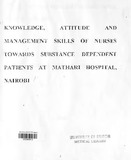| dc.description.abstract | Introduction: Substance use is significantlv related to a number of health issues ~ J •
including HIV /AIDS, sexually transmitted diseases, and other health problems (Incardi,
1995. Trapido & Lewis 1990). Several studies have been done to explore the aspects of
community statistics on substance dependence. However, Very few studies focusing on
the nurses' knowledge, attitude and skills towards substance dependent patients have
been done worldwide and actually none-in Kenya. The objective of this study was to
determine the nurses' knowledge, attitude and skills towards management of substance
dependent patients and the effect of post-basic psychiatric training on them ..
Methods: A cross sectional descriptive study was done. The study population was nurses
in direct care of mentally ill patients at Mathari hospital. A sample of 184 nurses was
randomly selected from all the 242 eligible nurses. Data on participants' knowledge,
attitude and skills was collected using a semi-structured questionnaire, self administered:
. ",by the participants. The data was entered, cleaned and analyzed in epi-info soft ware
2000 version 3.3.2 and standard normal distribution (z-value) to compute the frequencies
and the associations between knowledge, attitude and practice with participants'
experience, post-basic psychiatry training and other ,~emographic variables. These
associations were tested using chi-square tests of statistical significance .
Results: One fifty five (155) participants responded of whom 66% (101) were females.
80% (124) of the participants were from the civil department. Working experience ranged
from 1 to 33 years with a mean and median of 15 years. 27.7% (43) of all the participants
had a post basic psychiatric training. 43.2% (67) of the respondents had heard about
heroine, 29% (45) correctly identified its formulations while 29.7% (45) correctly
identified the route of heroine use. 49% (21) of those with post-basic training correctly
identified the route of heroin administration while 21% (24) of those without post-basic
correctly identified its use, OR 3.5 (95% CI 1.7-7.4), P=0.0007. 74% (114) would not
prefer nursing substance dependent patients as their first choice. 74.8% (115) of the
participants felt like quitting their profession due to nursing these patients. 54% (23), of
those with post-basic training felt like quitting, 83% (93) of those without felt like
quitting OR 0.2 (95% CI 0.1-0.5) l ==14.3 P= 0.0001. 16% (25) of all the nurses had
drawn a nursing care plan for patients with substance induced psychosis. 40% (17) of
those with post-basic psychiatric training had drawn a nursing care plan for a patient with
substance dependent psychiatric problem as compared to 7% (8) of those without, OR 8.5
(95% CI 3.3- 21.8), P < 0.0001.
Discussion: This study of nurses' knowledge, attitude and skills at the biggest referral
mental hospital in Kenya showed that nurses lack adequate knowledge on substances.
Other studies have shown that inadequate knowledge leads to negative attitude and poor
skills, (Horne 1985), as was shown in this study. Nurses with post-basic training were
shown to be having more knowledge of substances which translated to better skills and
more positive attitude towards substance dependent 'Psychiatric patients.
Recommendation: As a strategy to improve nurses' attitude and skills towards substance
dependent psychiatric patients, more nurses caring for mentally ill patients should be
encouraged to go for post basic psychiatric . training to improve their knowledge . | en |
| dc.description.department | a
Department of Psychiatry, University of Nairobi, ; bDepartment of Mental Health, School of Medicine,
Moi University, Eldoret, Kenya | |

